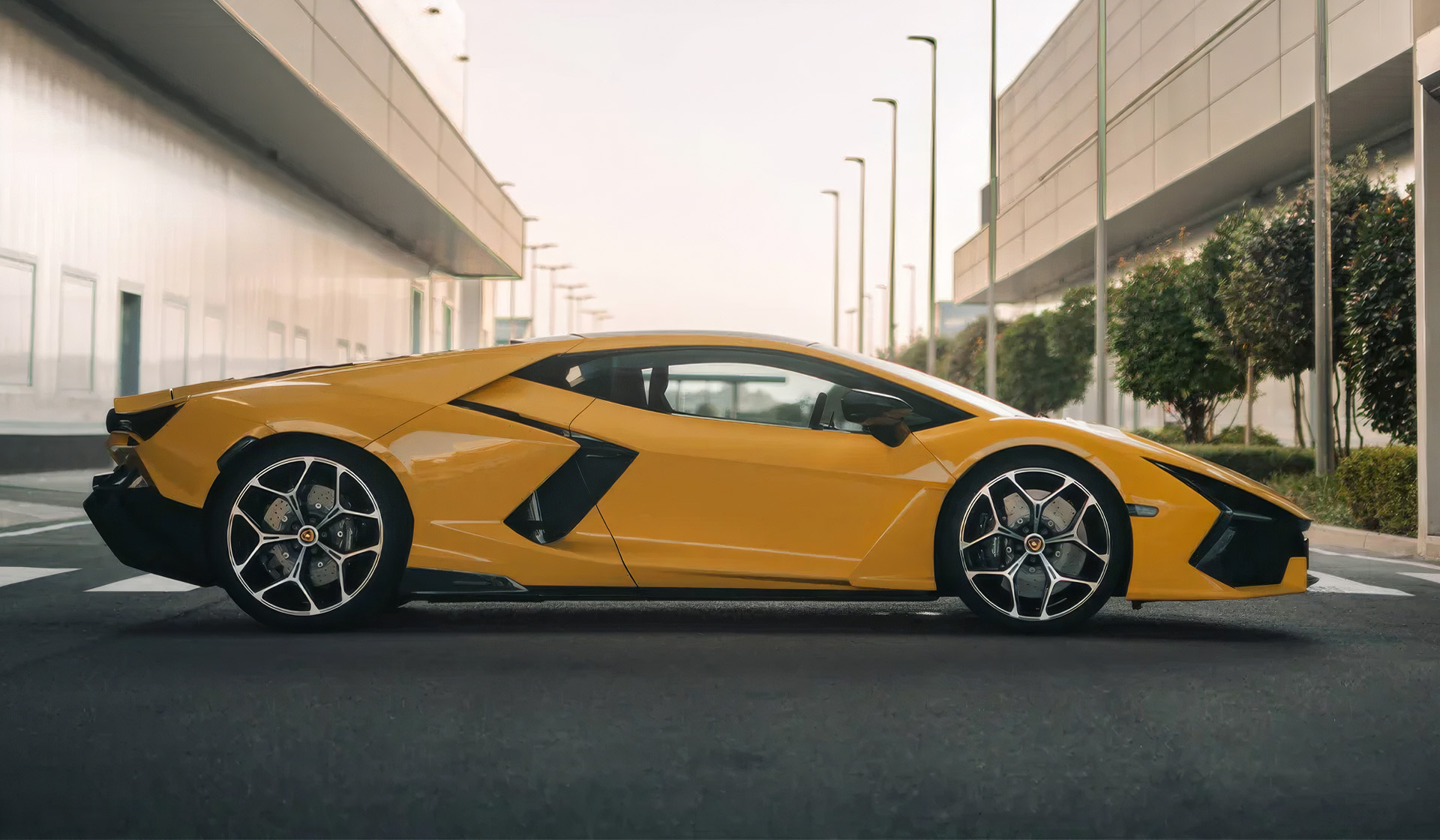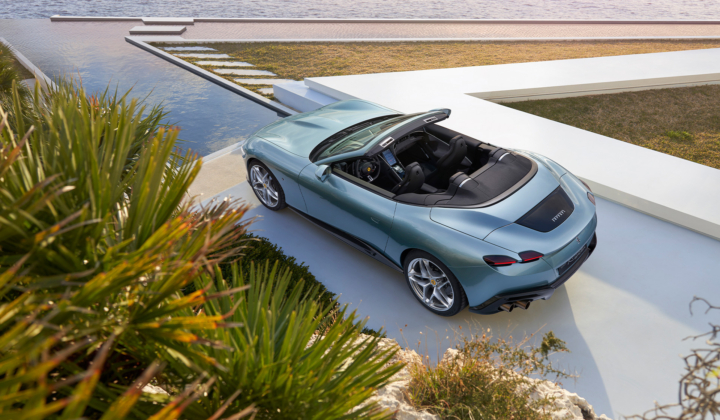8 Future Supercars We’re Looking Forward To In 2024
2024 is looking like a big year for the supercar, with releases slated for all the major players. Whether big engines, high-end design or the latest tech are your main interests in the car world, the supercar sector has always been the one that breeds innovation and pushes forward the auto industry.
Below we’re set to run down the most exciting new supercars coming this year: four already revealed and ready to hit the road in the coming months, with another four yet to be unveiled.
Aston Martin Vantage
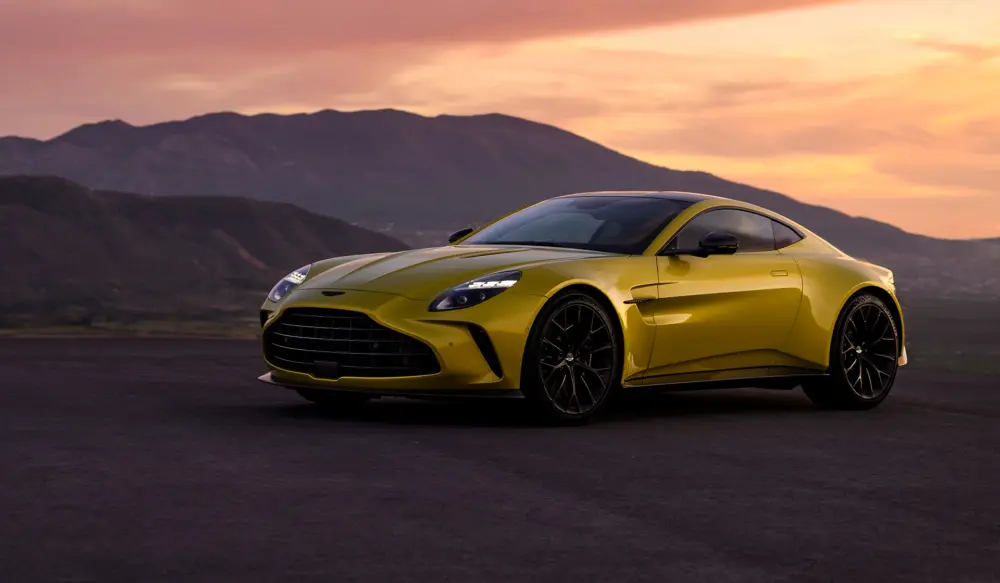
You might think the Vantage is more sports than supercar, but with 665hp the heavily revised new model is now firmly amongst the elite. Aston Martin has thrown the proverbial kitchen sink at the new Vantage, starting with that monumental firepower under the bonnet. The engine itself is related to the previous 4-litre V8, as sourced from AMG, but with more scope for tuning so too has come a very different attitude, says Aston Martin.
This starts with the added power, of course, but also its new and unique character that’s meant to channel this car’s driver focus. The turbochargers are smaller than the units found on the DBX707 SUV, which Aston says improves responsiveness and helps the car rev to its redline with more alacrity and enthusiasm. The gearbox has also been improved, with faster shifts and a shorter final drive that will run up the eight gears with even more ferocity than before.
The chassis has picked up its own selection of upgrades, including a fundamental redesign of the front axle with a focus on making the car manageable and fun over the limit of grip, suggesting that the torque surplus will remain a defining characteristic. Performance is extreme, with 0-62mph coming in 3.4 seconds, then going on to top out at a mental 202mph – that’s right on target for rivals from Porsche and Ferrari.
Yet it’s arguably the design which promises the most, with a new aesthetic that makes it look more aggressive than ever. The body itself is 30mm wider, with the front end featuring new upright headlights that give it a more distinctive face. Bigger 21-inch wheels are now standard, and together with the intricate rear lights and quad exhaust pipes make this look more desirable than ever.
How much? Well, this is now all yours for around £165,000. But we’d suggest it’ll be more (a lot more) by the time you’ve left the configuration suite.
Lamborghini Revuelto
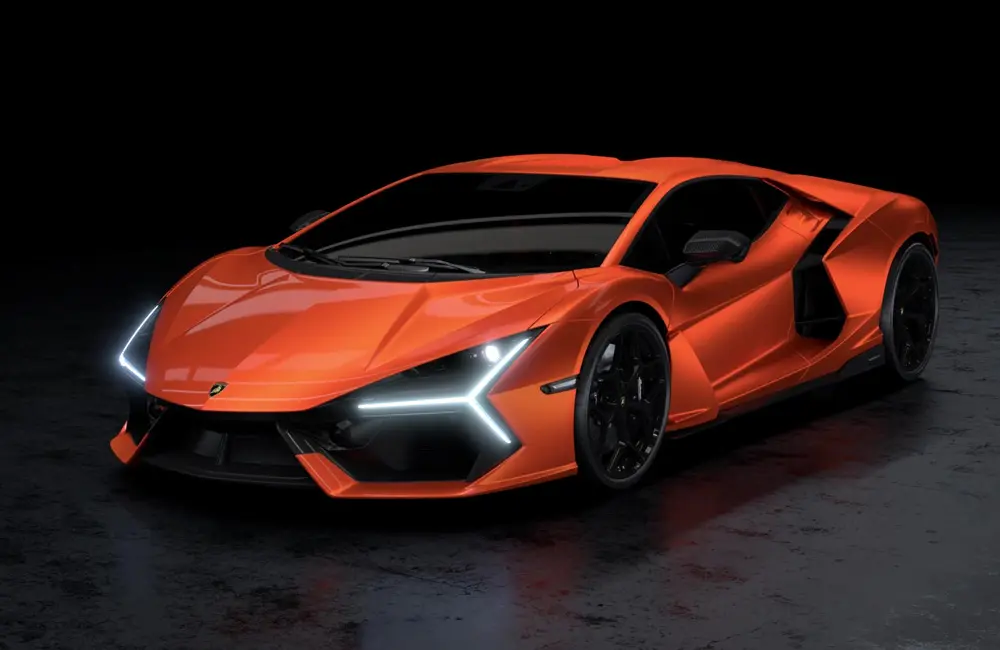
A new V12-powered Lamborghini is sort of like a Christopher Nolan film. There never seems to be a shortage of them, but every decade or so one comes along that’s truly momentous. Consider the new Lamborghini Revuelto as ‘The Dark Knight’, then, because it’s already proving to be a true showstopper.
Under the striking new body sits a hybrid-assisted V12 powertrain that produces an even 1,000hp. Fine, you might be thinking, the Ferrari SF90 has been punching those numbers for ages now, but the Lamborghini’s bespoke V12 is the defining factor here, using the electric powertrain components only to heighten the engine, not overwhelm it.
This means the noise we’ve come to love from Lamborghini’s isn’t just there, but is very much at the centre of the powertrain. Power from the V12 is then sent to the rear wheels through a new dual-clutch transmission, which arguably forms the biggest point of distinction from the older Aventador and its family of models. This joins the electrified front axle that powers two motors from a small lithium-ion battery, in turn making it all-wheel drive.
As well as the new powertrain, the Revuelto runs a brand new carbon fibre body, which is both stiffer and lighter than before, as well as a new generation of traction management systems that should make this even more fun to drive than the sometimes scary Aventador, and indeed its other V12 predecessors.
The design is also a step-change for the Italian marque, with a new and more complex design language being introduced. This features an arrangement of slashes and intakes, plus some unusual flying buttresses and an active rear wing. All of this can be painted in one of many lurid colour options, but as part of Lamborghini’s Ad Personam program, it can be produced in literally any combination of hues you could think of, both inside and out.
Maserati MC20 Folgore
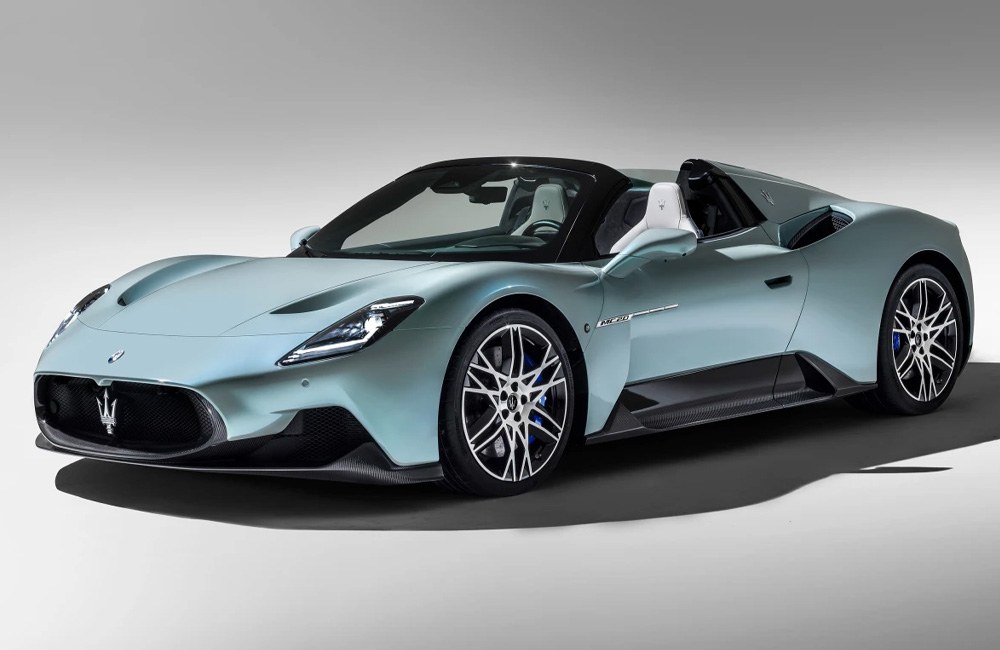
Maserati is the Roman tragedy of car manufacturers – always on the precipice of disaster and despair, yet through it all able to deliver some truly brilliant supercars. One such example is the MC20, launched a few years ago.
This otherwise simple V6-powered supercar might look like a Maserati of the old school (think Zegna rather than Gucci) but it was actually the remains of an abandoned Alfa Romeo project that Maserati picked up and created something brilliant with.
But that isn’t the model we’re talking about here, because while the MC20’s V6 engine is brilliant, if lacking some of the theatre associated with Italian supercars, it’s the all-electric Folgore version that’s now turning heads. Producing upwards of 1,200hp, the new Folgore, which is due to be revealed first in open-top Cielo, could just find its own little niche of ultimate power at a sub-seven-figure price tag.
Creating that power will be three electric motors – one on the front axle and two on the rear – which together will make the Folgore the fastest car Maserati’s ever built. It’ll hit 62mph in around 2.7 seconds, which despite weighing significantly more than the V6 model is 0.2 of a second faster. Apart from anything, we already know that the V6-powered MC20 drives brilliantly, but this could add some serious hypercar performance to the package.
All that’s left to do is drive this new electric model, pushing Maserati out in front of other supercar rivals like Ferrari, Lamborghini and Porsche in the race towards an electric supercar. And when it comes to Maserati, the result is never a foregone conclusion, which means this could just as likely turn out to be the best supercar in a generation. Alternatively, it could go in the other direction and fall victim to its extra weight.
In any case, it’ll be exciting – and that’s the whole point of a supercar, right?
Pagani Utopia

Pagani was arguably the founder of the modern hypercar, so when he starts from scratch to present an all-new model, it’s best we shut up and pay attention. The all-new model in question is called the Utopia, the third in a line of models that went through Zonda and Huayra.
After the brilliance of the Zonda, however, many thought that the slightly more GT-led Huayra was the wrong direction. Its rounder, more grecian volumes somehow suggesting a different experience to the hard-edged Zonda. This is where the Utopia comes in, because it looks to be a model that does its best to sit between the two, not a replacement for one or the other.
Under the enormous rear clamshell sits an AMG-sourced twin-turbocharged V12 engine that’s still built by special order for Pagani. In fact, this engine is now largely manufactured just for the Italian supercar maker, as well as a few lingering 12-cylinder Maybach models.
As it always has, though, when found in a Pagani, the engine is unshackled by the lack of weight and is capable of some truly astonishing performance. Its 858hp and 811lb-ft of torque will make light work of its exquisite carbon fibre structure, put onto the road via a single-clutch automated manual transmission or, and this is the big news, a 7-speed manual.
From a design perspective, it unashamedly references the Zonda, with much tighter surfacing and squarer design themes matched to the far more complex and intricate detailing associated with the later Huayra. The interior has the same mix of traditional craftsmanship matched to extra digitisation and modern production techniques.
Production will commence later this year, for a price well into the millions.
Ferrari F250
Every 10 years or so Ferrari reveals a new hypercar that previews the direction in which it is headed, both in terms of design and technology. In the late 1980s, it was the F40, then the F50, the Enzo and the LaFerrari after that, but this year will see the next step in what’s codenamed the F250. We still have a while to go until Ferrari reveals the car in full, but what we know so far is that it will preview the extremities of hybrid powertrains laced with high aero and an aggressive track focus.
We suspect the engine at its heart will be a turbocharged V6 engine, rather than a V8 or V12, to relate as closely as possible to the F1 racer, 499P Le Mans Hypercar and 296 GT3 racers. In fact, we expect that it’ll share an awful lot with the Le Mans Hypercar including a basic aerodynamic logic and its fundamental aesthetic.
This also means the powertrain will likely have a heavier reliance on its electric elements to provide its ultimate performance, with big leaps in terms of battery performance and track resilience that can and will be applied to its future series-production models.
If you’re one of Ferrari’s lucky owners capable of purchasing such a car and are disappointed by the lack of a V12, it’s worth remembering that Ferrari is such a supercar-churning machine these days that this future-focused model is the only aspect of the brand’s engineering ambitions, leaving the more nostalgic ‘Iconica’ series of limited-run supercars to lean back into old-school tech such as big multi-cylinder engines.
The Lamborghini Huracan Replacement
Hybrid is the name of the game down the road at Ferrari’s historic rival Lamborghini too, but the company looks to be going in its own direction for the Huracan replacement. Joining the Revuelto later this year, Lamborghini’s new hybrid-assisted supercar is expected to feature a similar segmented hybrid drive system as its larger sibling, as well as a smaller V8 petrol engine mounted behind the driver.
While this does wave goodbye to the iconic V10 engine, this should see a major increase in power and torque for Lamborghini’s smaller supercar model, as well as generous improvements to fuel consumption and efficiency – now required by law in Europe and Asia. This still does compare favourably to many rivals if you’re a multi-cylinder fan, though, with Ferrari and McLaren both going down to a V6 in their somewhat comparable 296 and Artura models.
The design will also be a slightly toned-down take on the Revuelto, but like the previous Huracan and Gallardo before, that will almost revel in its compact dimensions to become even more exploitable on the road. Prototypes show off a new set of hexagonal lighting signatures at the front paired to the thinnest of headlight units, while out back the open-deck style engine compartment is also in use.
Inside, expect more tech and just as much focus on personalisation and high material quality as before, with Lamborghini’s own interfaces and a greater distance put between it and the Audi models which it used to share its fundamental underpinnings with. We say ‘used to’ because this time around there won’t be an Audi twin to fight for sales, proving that Lamborghini is a supercar manufacturer capable of supporting its own bespoke supercar engineering on multiple levels – just don’t mention the Urus SUV that pays the bills.
Aston Martin Valhalla
The Vantage above might be considered typical in Aston Martin’s recent history, but the new Valhalla coming later this year is anything but. This mid-engined supercar will cost upwards of £1,000,000 and operate in a space above cars like the Revuelto and Ferrari SF90, without treading on the toes of Valkyrie.
Powered by its own hybrid powertrain, Aston Martin has scrapped plans to engineer its own unique V6 and instead turned back to its V8 supplier AMG for the main power unit – just like F1. As it’s done with the new Vantage and DB12, the Valhalla’s engine has been considerably uprated and retuned, with its own bespoke turbochargers and engine mapping.
Thanks to the use of its clever hybrid system, not only will the Valhalla have upwards of 1,000hp, but due to the extra torque provided from the electric motors, Aston will be able to tune the V8 to suit, applying big boost figures that will sing at high revs, leaving the electric motors to plug the torque gap beneath.
From Aston’s own spy shots, we can see Aston’s design department taking another step on from the Valkyrie’s insect-like surfacing, creating a new design language that sits between its racing cars and sports car range. The Valhalla will have lots of new range mates to sit alongside by the time it reaches customers, with another new super sports model to come in the form of a DBS replacement.
How many models are too many? Aston will have to wait and see.
The New Bugatti
Bugatti is quite possibly the ultimate hypercar manufacturer, but what happens after Chiron? Well, the brand’s new placement between the main VW Group and its new owners Rimac means the next generation will likely find its heart in both camps, becoming a hybrid in the next generation. While we know little on the record, the next model could continue to use the W16 engine, despite pressures around its emissions.
To do so, the hybrid element will need to be significant, and with such tight packaging just to fit the engine, the new model will likely feature a proper overhaul of its fundamental chassis design and structure. This will also likely mean its compact appearance will grow, with all the requisite cooling required sure to drive much of the design.
But as with all Bugatti’s, its key deliverable will be unstoppable speed, with the same level of glamorous quasi-art deco design at its heart. Bugatti’s have always been built with a near money-no-object sense and this new model will likely be the same. As such, the interior should have a similar mantra, with a focus on reduced digital displays to keep the model as timeless as possible.
With such a massive step-change due, we suspect the development process will be a long one, even after the car’s expected debut later this year. As such, we don’t expect to see any loitering around Mayfair or King’s Road until 2026 at the earliest, with production limited just like the Chiron and Veyron before it.
